Author Archive
 |
15. June 2010 – 10:13 by E-Voting.CC
|
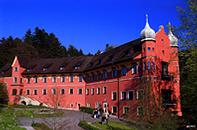 Our “EVOTE” Conferences have become an international meeting point for e-voting experts worldwide. This year’s “EVOTE2010″ will be the fourth of it’s kind.
Our “EVOTE” Conferences have become an international meeting point for e-voting experts worldwide. This year’s “EVOTE2010″ will be the fourth of it’s kind.
Today, June 15, the reduced early registration fee ends! (300€ including social events)
From June 16 the price will be 360€.
In order to get the discounted fee, register online today!
The 4. International Conference on Electronic Voting will be held from July 21 to 24 of 2010 in Bregenz, Austria. Please have a look at our internationally casted conference programme here.
We are looking forward to seeing you at the conference in July – so register now!
Daniel Botz – EVOTE2010 Conference Manager
Posted in Debate Europe, Events, experince, ICT, News, Projects, Uncategorized | No Comments »
 |
28. April 2010 – 19:44 by E-Voting.CC
|
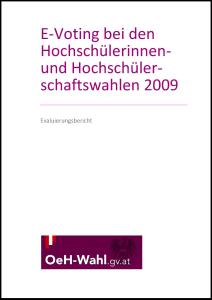 The final report on the Austrian E-Voting use is online an available for download in German here. Read the short summary of the report on Pep-Net.eu:
The final report on the Austrian E-Voting use is online an available for download in German here. Read the short summary of the report on Pep-Net.eu:
The implementation of e-voting for the elections to the Austrian Federation of students was one of the most sophisticated e-government projects in 2009. It’s aim was to complement the paper based voting with an electronic voting channel. Together with the implementation of e-voting the legal basis was adapted to include an electronic election administration.
This first of a kind implementation of e-voting in Austria was technically successful. Almost 1% (2.161) of the eligible students cast their votes electronically between 18th and 22nd of May 2009. For identification and authentication, they used the citizen card (the Austrian model of a smart card with digital signature) and a suitable smartcard-reader device, which was handed out for free. The anonymity was performed by using a cryptographic protocol in the post-electoral phase, similar to a paper based postal voting procedure. The e-voting servers were placed in two data centers of the Federal Computing Centre to allow for fail-safe operation.
The use of the citizen card was appropriate because of its associated high safety and powerful legal standing. However the penetration of the citizen card is rather low at present. Therefore, the federal ministry of science and research started the initiative studi.gv.at with the purpose to raise awareness and penetration of the citizen card amongst students. While over 14.000 students made use of this opportunity, only a small portion of them used e-voting. Main reason to this is the general limited number of applications aimed at students which make use of this card. The general acceptance and with it the penetration numbers for this smart card will only be reached when a wide range and a large number of additional services are provided with appropriate functionality, especially for students.
The discussion around e-voting was rather controversial with clear pro and contra positions. On the one side the federal ministry of science and research and on the other side selected representatives of the federation of students. The discussion dominated the electoral campaigns and hurt the institution of the elections.
For future uses of e-voting in Austria the penetration of identification and authentication means has to be raised as well as a more positive atmosphere amongst the stakeholders has to be reached.
by E-Voting.CC
Posted in Events, experince, News, Projects | No Comments »
 |
26. February 2010 – 10:32 by E-Voting.CC
|
Today, on Friday 26th of February, the extended deadline for paper submission for the EVOTE2010 conference is due! The last chance to submit you scientific papers and participate in our renowned issue of our fourth issue of the International Conference on E-Voting – EVOTE2010.
The conference will take place from July 21st to July 24th in Bregenz at the beautiful lake Constance.
We are looking forward to another highly international and very interesting event!
Daniel Botz – E-Voting.CC
Posted in Events, News, Projects, Uncategorized | No Comments »
 |
16. February 2010 – 15:01 by E-Voting.CC
|
In response to the large number of requests from the community, the organizing committee of the 4th Electronic Voting Conference EVOTE2010 decided to extend the deadline for submission of papers by two weeks from Friday February 12 to Friday February 26, 2010.
Please find further information, templates and the call for papers here.
I hope this helps to finish your papers in time!
Daniel Botz, E-Voting.CC
Posted in members, News, Projects | No Comments »
 |
6. August 2009 – 08:36 by E-Voting.CC
|
Our Conference Proceedings of the 3rd International Conference on Electronic Voting, which was held from 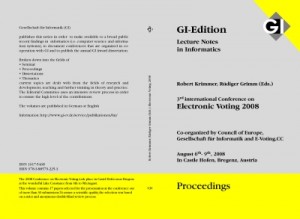 7th to 9th of August 2008 in Castle Hofen, are now online. Exactly one year after the opening session we are glad to publish them on the web. You can download the PDF here.
7th to 9th of August 2008 in Castle Hofen, are now online. Exactly one year after the opening session we are glad to publish them on the web. You can download the PDF here.
This year’s proceedings contain the seventeen papers selected for the presentation at the conference out of more than forty submissions. To assure scientific quality, the selection was based on a strict and anonymous review process. The papers cover the following subjects: e-voting experiences, social, legal, political, democratic and security issues of e-voting, as well as solutions on how to (re)design election workflows, and finally how to implement and observe electronic voting systems.
You can order the proceedings in print for EUR 19,70 (+shipping & handling) by sending an e-mail to office@e-voting.cc.
For citation and download purposes please use:
Krimmer, R., Grimm, R. (Eds.): Electronic Voting 2008, GI Lecture Notes in Informatics, P-131, Bonn, 2008.
Daniel Botz, E-Voting.CC
Posted in News | No Comments »
 |
23. July 2009 – 15:19 by E-Voting.CC
|
The fourth International Conference on Electronic Voting is coming up. There’s still one year to 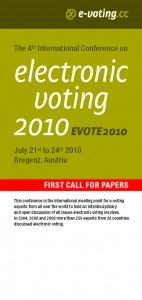 go, nevertheless our first call for papers folder is out now! Please click on the image to download the folder as a PDF.
go, nevertheless our first call for papers folder is out now! Please click on the image to download the folder as a PDF.
For the fourth time since 2004 our exclusive conference with hundred key experts and deciders from all five continents will be held from the 21th until the 24th of July 2010. The venue will be, as in previous years, the beautiful Castle Hofen, which is situated in Lochau in the vicinity of Bregenz and Lake Constance.
The conference will focus on all aspects of electronic voting, such as legal, technical, social, political questions as well as reports on implementations and practical experiences throughout Europe and the world. There will also be workshops on different topics held by designated experts in the field. The regular Conference Fee will be 300EUR (incl. VAT). The event is limited to 110 visitors only.
Social activities such as the legendary dinner event “Käsestraße” or a visit of Giuseppe Verdi’s opera “Aida” at the floating stage in Bregenz are the highlights after the work has been done. We will also host a Pep-Net meeting in the fore field of the conference.
The time line for submission of the papers is as follows:
Submission of the full paper: February, 12th 2010
Review deadline: March, 12th 2010
Notification of acceptance: April, 5th 2010
Receipt of the final paper: May, 14th 2010
If you are interested in submitting you paper or in attending the conference, send us an email with your inquiry to: 2010 [at] e-voting.cc.
by Daniel Botz – E-Voting.CC
Posted in members, News | No Comments »
 |
25. June 2009 – 15:03 by E-Voting.CC
|
Earlier I have written about the Student Union elections of May 2009 which were Austria’s first use of a legally binding electronic voting system.
The E-Voting system required the students to authenticate themselves using a citizen card. In Austria this “citizen card function” is included in the social security card, which is called e-card. The e-card was launched in March 2005 in order to modernize the old fashioned system of legitimizing the citizen’s status in front of doctors via the paper version of the “Krankenschein”.
The e-card has since then been issued 8.5 million times according to the official website. 11.151 partners accept the e-card in doctor’s practices all over Austria and it has been used 405 million times for this purpose. But the e-card is much more than a tool for more efficient social security administration. Read the rest of this entry »
Posted in good practice, News, Projects, Trends | No Comments »
 |
24. June 2009 – 16:30 by E-Voting.CC
|
The Austrian Expatriate World Council was founded in 1952 aiming to coordinate the various existing associations of Austrian citizens living abroad. Its primary function is to represent its members in front of the Austrian federal government, public authorities, political parties and relevant departments in the economic and cultural field. It is governing body of over 170 associations and has several thousand members.
The organization has now again, as in previous years, made an effort to research its members’ needs. From the beginning of March until April 20th an anonymous online survey has been conducted to find a better understanding for these needs and to communicate them to the Austrian Foreign Ministry.
The Austrian Federal Computing Centre (BRZ) was in charge of designing, setting up and implementing the online platform. The survey consisted of ten themes related to which e-Government and e-Participation services expats want from Austria. Three of them were to be picked as a choice, an own suggestion could also be added. The answers were weighted, points were given according to the relative importance. The themes were:
Read the rest of this entry »
Posted in good practice, News, Projects, Trends, Uncategorized | No Comments »
 |
18. May 2009 – 16:17 by E-Voting.CC
|
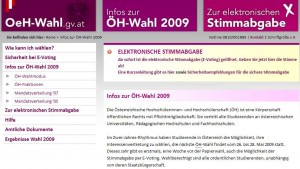 Today at 08:00 am the first legally binding electronic election in Austrian history went online! The Austrian Federal Student Union is being elected starting today morning and running until Friday via a remote electronic channel. Next week from Tuesday the 26th until Thursday the 28th of May an ordinary, paper based voting channel will be opened to ensure.
Today at 08:00 am the first legally binding electronic election in Austrian history went online! The Austrian Federal Student Union is being elected starting today morning and running until Friday via a remote electronic channel. Next week from Tuesday the 26th until Thursday the 28th of May an ordinary, paper based voting channel will be opened to ensure.
The paper and the electronic votes will be counted on the 28th and hence the result should be available around Thursday evening.
The voting system was programmed by the Spanish E-Voting specialist Scytl and is hosted at the Austrian Federal Computation Center. The Austrian Ministry of Science and Research is the initiator, Robert Krimmer from E-Voting.CC is consulting the implementation process.
The going online of the voting system this morning went as planned. A minor problem although occurred with the Intranet connection at the BRZ but this was quickly solved and did in no way affect the voting system itself.
We are glad and also a bit proud, that this project is now successfully in the “delivery phase”, we hope everything will keep running smoothly!
Daniel Botz, E-Voting.CC
Posted in good practice, News, Tools, Trends, TuTech, Uncategorized, Visions | No Comments »
 |
5. May 2009 – 10:33 by E-Voting.CC
|
Finally our newest project has been released and delivered to our readers: The biannual free special 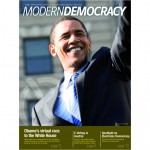 interest magazine “Modern Democracy” by E-Voting.CC.
interest magazine “Modern Democracy” by E-Voting.CC.
As I have announced in an earlier entry we issued the first edition of our magazine dealing with selected topics in the field of E-Democracy and it’s newest developments. The magazine is distributed all around the world.
Before I give you a quick overview of the contents, I want to thank all of you who have mailed us the registration coupons. The responses were overwhelmingly positive and gave us the affirmation that such a magazine is needed and wanted. Thank you for all the positive feedback!
The first article deals with the upcoming student union elections in Austria. This event will mark the entry of Austria into the list of countries with legally binding electronic elections. Students will be able to cast their vote via Internet from May 18th until May 22nd – one week before the paper election. The results will be counted after the last polling stations are closed.
The intention behind this project is to give every student an easy and uncomplicated way of participating in these biannual elections and to innovate the Austrian voting procedures.
Read the rest of this entry »
Posted in Interview, News, Projects, Trends, Uncategorized | No Comments »
 Our “EVOTE” Conferences have become an international meeting point for e-voting experts worldwide. This year’s “EVOTE2010″ will be the fourth of it’s kind.
Our “EVOTE” Conferences have become an international meeting point for e-voting experts worldwide. This year’s “EVOTE2010″ will be the fourth of it’s kind.
 The final report on the Austrian E-Voting use is online an available for download in German
The final report on the Austrian E-Voting use is online an available for download in German 









